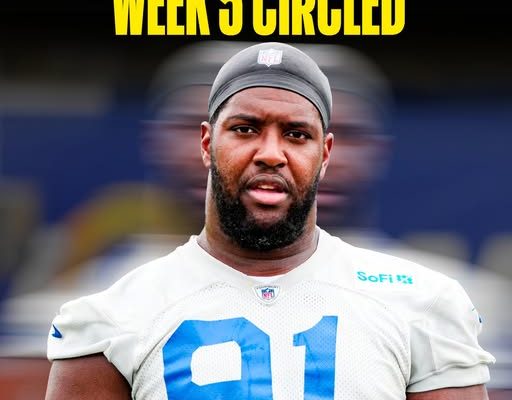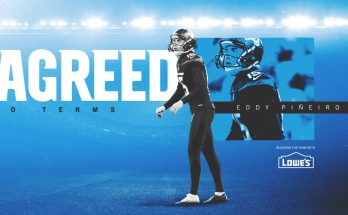The NFL is built on rivalries. Some of them are historic, others are born in the heat of playoff battles, and a few emerge suddenly—emotional flames lit by key players whose ambition and pride refuse to let a moment go. For Los Angeles Rams’ defensive tackle Kobie Turner, Week 3 against the Philadelphia Eagles isn’t just another early-season game. It’s personal. This isn’t about hype or media narratives. It’s about respect, unfinished business, and the kind of fire that fuels greatness on the football field.
When Turner appeared on NFL Network and declared that this matchup means more to him than most, fans were instantly curious. Why is a Week 3 NFC inter-conference clash such a big deal? The Rams aren’t division rivals with the Eagles. There’s no extended history of bad blood. But that’s where the story gets interesting, because the root of Turner’s motivation isn’t external—it’s internal. It’s about a memory, a moment, and a mission to set the record straight.
To understand the significance of this, you have to go back to the 2023 NFL season. The Rams met the Eagles at SoFi Stadium in Week 5. That game was a battle between a young Rams team trying to reassert itself after a disappointing 2022 season, and an Eagles squad coming off a Super Bowl appearance and loaded with elite talent on both sides of the ball. Turner, a third-round rookie out of Wake Forest, was starting to make a name for himself in the trenches. With Aaron Donald commanding attention, Turner had a unique opportunity to shine. And he did. He was physical, disruptive, and aggressive—everything the Rams could have hoped for. But they still lost that game 23-14.
For many Rams fans, it was a respectable performance against one of the league’s elite teams. For Turner, it wasn’t good enough. After the loss, he spoke modestly in post-game interviews, but those close to the Rams’ locker room say Turner never quite let that one go. It stuck with him. Not just because of the loss, but because of how that game shaped external perceptions. Turner’s performance was overlooked in the larger media conversation. The Rams were dismissed as not ready to compete with the NFL’s heavyweights. The Eagles were praised for their efficiency, composure, and strength in the trenches—precisely the battleground Turner cares most about.
Now entering his second season, Turner isn’t holding back. His comments on NFL Network weren’t boastful or out of line. They were measured, direct, and intense. “Week 3 is personal,” he said, locking eyes with the camera. You could feel the weight behind those words. They weren’t just about payback or pride. They were about identity—his, and that of the Rams’ defense. Turner wants to prove that he belongs in the conversation with the NFL’s best defensive tackles. He wants to demonstrate that the Rams’ defense, often overshadowed by stars like Donald or off-field stories involving Sean McVay’s offensive genius, has another anchor worth recognizing.
Kobie Turner is not the type of player to chase attention. At 6-foot-2 and 288 pounds, he plays with a relentless motor that makes up for any perceived lack of size. He’s a technician with his hands, explosive off the snap, and fundamentally sound. But what separates Turner is his mentality. He was overlooked in high school, started his college career at Richmond before transferring to Wake Forest, and wasn’t taken until the third round of the draft despite being one of the most productive interior defenders in college football in his final year. None of that was lost on him. Every slight fuels the chip on his shoulder.
Against a team like the Eagles, that chip becomes even more crucial. Philadelphia is known for having arguably the best offensive line in football. Lane Johnson, Jason Kelce (now retired, but replaced by another highly touted lineman), and Jordan Mailata have turned their line into a fortress. They protect Jalen Hurts like a presidential detail, and they create enormous gaps for the run game. Last year, the Eagles ran the ball down the Rams’ throats for 159 yards. Turner had a few tackles and a couple of pressures, but the game was defined by the Eagles’ ability to control the line of scrimmage.
That fact eats at him. Defensive linemen live for those moments—the trench warfare that determines the outcome of the game before the ball even leaves the quarterback’s hands. If you control the line, you control the tempo, the rhythm, the narrative. Turner knows this. And in his mind, the Eagles took that from him. So this year, Week 3 is about reclaiming it.
There’s also a psychological component at play. Great athletes often manufacture motivation when it doesn’t exist naturally. But in Turner’s case, this is not fabricated. It’s not bulletin-board material for the sake of motivation. It’s rooted in the truth of how the previous matchup unfolded. He felt disrespected, not necessarily by trash talk or taunts, but by the way his unit was physically handled and the way the league moved on from the game as if it were just another example of the Eagles being dominant and the Rams being ordinary.
In today’s NFL, narratives are currency. They affect Pro Bowl votes, contract negotiations, media coverage, and legacy. Turner, still early in his career, understands this dynamic. He knows that moments like these—statement games against elite opponents—can shape reputations and shift public perception. If he plays lights out against the Eagles and helps the Rams win, he won’t need to say a word. The tape will speak volumes. His name will surface in defensive rankings. Analysts will begin to draw attention to his impact alongside Donald rather than under him.
What makes this all the more compelling is the current state of the Rams. They’re in a transitional phase. Yes, Matthew Stafford is still the quarterback. Cooper Kupp remains a weapon when healthy. Donald decided to return. But the franchise is investing heavily in its young core—players like Turner, Byron Young, Ernest Jones, and Kobie Durant. Turner isn’t just a contributor; he’s a foundational piece now. If the Rams are going to reclaim a top spot in the NFC, it’s not going to happen solely through their veterans—it’ll be through emerging stars like Turner embracing leadership roles.
He’s clearly ready for that. During the offseason, coaches praised his work ethic, film study, and influence in the locker room. Younger players gravitate toward him because he leads without theatrics. He’s business-first, emotion-driven, and completely locked in when it comes to his craft. That’s why his remarks about Week 3 carry so much weight. They weren’t just emotional outbursts. They were statements of intent from someone who understands the stakes, the opportunity, and the symbolism behind that game.
The Rams coaching staff is also leaning into this mentality. Defensive coordinator Chris Shula has emphasized toughness, gap integrity, and accountability throughout camp. Against a team like the Eagles, all three will be tested. Turner is likely to be double-teamed on early downs and targeted with combo blocks in the run game. His ability to hold ground, split gaps, and collapse the pocket will directly impact whether or not the Rams defense can force Hurts into quick decisions or allow long drives that wear them down. If Turner wins his matchups, it will ripple across the defense—from the linebackers who’ll be free to pursue, to the secondary that can play tighter coverage with pressure up front.
And if the Rams win? The implications go far beyond one victory. It would be a message to the league that the Rams are not a rebuilding team—they’re a team with teeth. It would mark the beginning of Turner’s rise from promising interior lineman to household name. It would validate his offseason preparation and add fuel to what’s already becoming a notable career trajectory. For the fans, it would reignite the belief that this team still has championship DNA, even if the faces are changing.
On the flip side, if the Rams fall short, it won’t be for lack of effort. Turner has made it clear he’s leaving everything on the field that Sunday. And sometimes, just naming your shot—just drawing that line in the sand—is enough to elevate a performance and shift team dynamics. Players take cues from vocal leaders. Turner stating that this game is personal lets every man on that defense know that this isn’t just another Sunday. It’s a chance to stand tall against a standard-bearing opponent and prove they belong in the same tier.
You won’t see Turner dancing before the game. You won’t see him jawing for attention. But what you will see is a player firing off the line with bad intentions. You’ll see a technician fighting for every inch of leverage, for every pocket collapse, for every tackle for loss. You’ll see a man on a mission to redeem what he views as a blemish, not because the world is watching, but because he is.
When the clock starts ticking in Week 3, it won’t be a playoff game. It won’t have seeding implications or a division crown on the line. But for Kobie Turner, it will mean everything. Not just another shot at the champs. A shot at redemption. A shot at proving that grit, memory, and fire can still define a player in today’s NFL. And if you know anything about the trenches, you know that those intangible forces—when channeled correctly—are often more powerful than talent alone.
Turner isn’t just preparing for a game. He’s preparing for a reckoning. One that’s been brewing since the moment the Eagles walked out of SoFi with a win last year. This time, the Rams’ defense will be waiting. And at the heart of it, with eyes locked and pads low, will be Kobie Turner—ready to rewrite the story.



